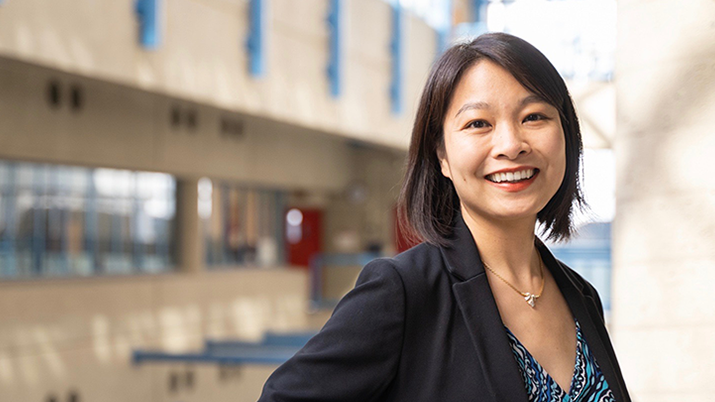Dr. Azim Shariff joins the Royal Society of Canada College of New Scholars, Artists and Scientists.
On September 3, Dr. Azim Shariff was welcomed as a Member of the College of New Scholars, Artists and Scientists by the Royal Society of Canada (RSC). This prestigious recognition honours Canada’s emerging generation of scholarly, scientific and artistic leadership. Dr. Shariff is among the fifteen UBC faculty members who have been announced by the Royal Society of Canada as new Fellows and as Members of the College of New Scholars, Artists and Scientists.
On September 10, the Royal Society of Canada also announced that Dr. Shariff received the Kitty Newman Memorial Award, which recognizes the outstanding contributions from an emerging scholar in the field of philosophy.
Dr. Shariff is a Canada 150 Research Chair and a professor in UBC’s department of psychology. He has conducted research on religion, climate change, economic mobility, free will and punishment, privacy and driverless cars. His work investigates how our often-ancient moral intuitions shape and respond to the cultural institutions and technologies of the modern world.
Dr. Shariff joins us for a Q&A on this recognition and new research he’s excited about.
What does this recognition mean to you—and to your research program?
I’m very grateful to be recognized, and to join such a venerable Canadian institution. It’s also an honour to follow my colleagues Kiley Hamlin and Elizabeth Dunn who have been inducted to the College of New Scholars before me. Pretty good company.
The Kitty Newman Memorial Award is given every year to an emerging Canadian scholar in the field of philosophy—broadly construed. It was endowed by a fellow of the RSC—Jay Newman—who studied the philosophy of (among other things) religion and culture. I don’t think the award has ever been given to a psychologist before. In that sense, it’s a meaningful recognition of the breadth of the work coming out of my lab. We are a psychology lab, but our research is heavily influenced by philosophy, and has the same kind of broad focus on topics like religion, culture, and technology that Dr. Newman had. I’m very honoured.
“I’m very grateful to everyone involved in this honour. Most proximally, that’s my nominees, to whom I owe a great debt that will one day be repaid in margaritas. But it’s also my students, my mentors, and my unusually large stable of wonderful collaborators.”
What do you want to say to your peers who nominated you?
I’m very grateful to everyone involved in this honour. Most proximally, that’s my nominees, to whom I owe a great debt that will one day be repaid in margaritas. But it’s also my students, my mentors, and my unusually large stable of wonderful collaborators.
Can you tell us about any new research that you’re excited about?
There are so many projects at various stages of the pipeline that I’m really excited about, but I’ll briefly mention two. First, two former graduate students—John Michael Kelly, and Stephanie Kramer—and I have just published a massive meta-analysis of the research investigating the relationship between religiosity and prosocial behaviour. It brings together 700 different studies spanning nearly 60 years, making it the largest meta-analysis on religiosity ever done. It finds a modest but solid relationship, whether we test for higher prosociality (charity, volunteering) or lower antisociality (aggression, crime), at WEIRD or non-WEIRD countries, whether religiosity is measured as attendance, belief or affiliation, & whether prosociality is measured via self-report or behaviour.
Second, with a different set of collaborators, including an excellent student at UPenn—Calvin Isch—and my incoming graduate student, Charul Maheshka, I’ve been recently taking a moral psychology lens to politicization and trust. One working paper we have out shows, for instance, that when an institution takes a political stance, it loses trust not just among people who oppose that position, but even those who support it. There is a trust deficit across nearly all institutions, so understanding the psychology behind is pretty important, I think.
Azim Shariff is a Professor and Canada 150 Research Chair in the Department of Psychology at the University of British Columbia. He is one of the world’s leading young scholars in the areas of social psychology. He has gained international acclaim for his research, which delves into subjects such as the connection between religion and morality, and the way that people emotionally and intellectually react to emerging technologies.
On Friday, November 8, 2024, the RSC will induct the 2024 Fellows and Members of the RSC College at a ceremony as part of the Celebration of Excellence and Engagement in Vancouver, British Columbia.
Please join us in congratulating Dr. Shariff on this honour!
“The Royal Society of Canada is very proud to welcome today an imposing group of inspiring scholars, artists and creators whose peers have recognized their exceptional contributions to the world of science and culture and to the well-being of Canada. The impact of their work will continue to be felt in the development of public policies for years to come, while contributing to the well-being of our society.”
Watch Dr. Shariff’s TED Talk, where he discusses our tendency to value displays of effort and the impact that has on society.


